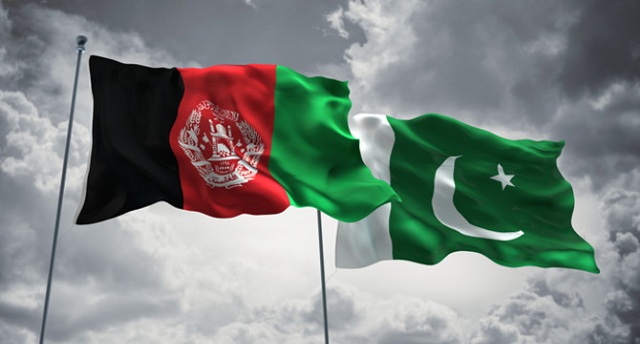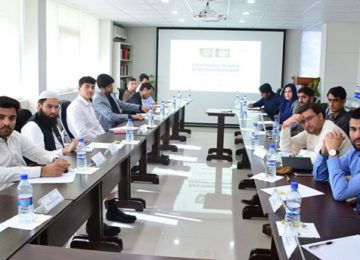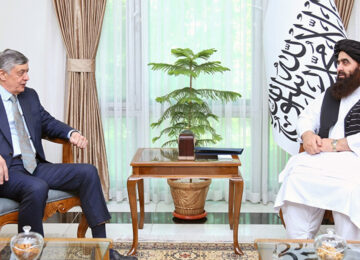Pakistan has formally reopened the Ghulam Khan crossing point – a major trade route with its landlocked neighbor, Afghanistan, after nearly four years. Pakistan’s Prime Minister Shahid Khaqan Abbasi traveled to Waziristan on April 30 for the inauguration of the newly constructed terminal to resume cross-border trading activities with Afghanistan through Ghulam Khan.
It is one of the eighteen border crossing points between the two countries that connects Pakistan’s North Waziristan tribal region with northeastern Khost Province of Afghanistan. It is also the third-largest official crossing point on the nearly 2,600-kilometer – mostly porous – frontier between Pakistan and Afghanistan. The route serves as the shortest one from Karachi to Kabul, reducing the total distance by more than 400 kilometers, as compared to Torkham.
Re-opening of the Ghulam Khan trade route has been a long-standing demand at the meetings of the Center for Research and Security Studies’ (CRSS) Pakistan-Afghanistan Beyond Boundaries Track 1.5 & II initiative with Pakistan Afghanistan Joint Chambers of Commerce (PAJCCI); where the Pak-Afghan delegates on many occasions highlighted the subject matter to concerned authorities.
Mozamil Shinwari, Advisor to Afghan CEO Dr. Abdullah Abdullah, and former Deputy Minister for Trade and Commerce also stressed on the need for operationalizing the Ghulam Khan transit point due to its economic viability, while speaking at a Pak-Afghan Youth Dialogue organized by CRSS in Islamabad. This dialogue was based on the theme of enhancing trade and economic development in Pakistan and Afghanistan in September 2017.
With the trade route now open, officials and business community on both sides has welcomed the resumption of trade through the crossing, hoping the move will ease political tensions and increase bilateral trade. Afghan and Pakistani traders have long urged their respective governments to delink economics from politics to promote mutual trust.
Pakistani Military officials pronounce that the Waziristan region has been almost completely secured; rehabilitation as well as reconstruction activities are currently under way. Authorities had closed the remote Ghulam Khan border crossing in North Waziristan in 2014. This was due to the launching of a major army-led counter-militancy offensive in the tribal belt; once condemned as the breeding ground for international terrorism.
While Afghanistan shares a common religion, race, history, ethnicity and geography with Pakistan, the relations between both have never remained smooth for longer periods. Therefore, Pak-Afghan relations have constantly witnessed ups and downs. The Pak-Afghan troubled ties have also prompted Afghans to look for alternate routes. Hence Afghanistan has recently turned its attention to the India-funded Iranian port of Chabahar for transit trade, with the intention of bypassing Pakistan.
The Pak-Afghan trade volume, despite having a potential of $5 billion, has declined from $2.5 billion to $1.4 billion lately. Additionally, recent figures are showing a rise in Afghanistan’s trade with Iran (both transit and bilateral) and a corresponding decline in business with Pakistan due to disturbing political ties accruing since long.
Nonetheless, latest engagements between the top leadership of Pakistan and Afghanistan have gone beyond just rhetoric to shed light on required actions on areas of mutual concern. Hence, General Bajwa’s recent visit to Kabul was reciprocated by President Ghani with an invitation to Pakistan’s PM Abbasi to visit Kabul. The Pakistan PM diligently accepted the invitation with his Kabul visit resulting in productive meetings with the Afghan leadership.
Afghanistan and Pakistan need to realize that geopolitical realities are not the same as they used to be. Regional dynamics have changed. Trade for both countries is a win-win situation, which will also ensure regional stability and sustainable peace. Both nations need to improve trade facilitation through streamlined payments settlement and improved insurance mechanisms, the use of bonded carriers, trade financing, tax collection, and documentation.
Moreover, people-to-people contact is crucial for sustainable trade relations; therefore, business visa policy needs to be relaxed further. Various options, such as visa-on-arrival, long-term, multiple-entry visas, and investment-friendly visas for businessmen and skilled workers, could be explored and implemented in letter and spirit on both sides.
It is a high time that Pakistan and Afghanistan follow the global shift from geo-politics to geo-economics for a sustainable and progressive common future.
The author Saddam Hussein is a Research Fellow at Center for Research and Security Studies (CRSS), Islamabad, while pursuing his MPhil. in Public Policy from School of Public Policy, Pakistan Institute of Development Economics (PIDE), Islamabad. He tweets @saddampide








